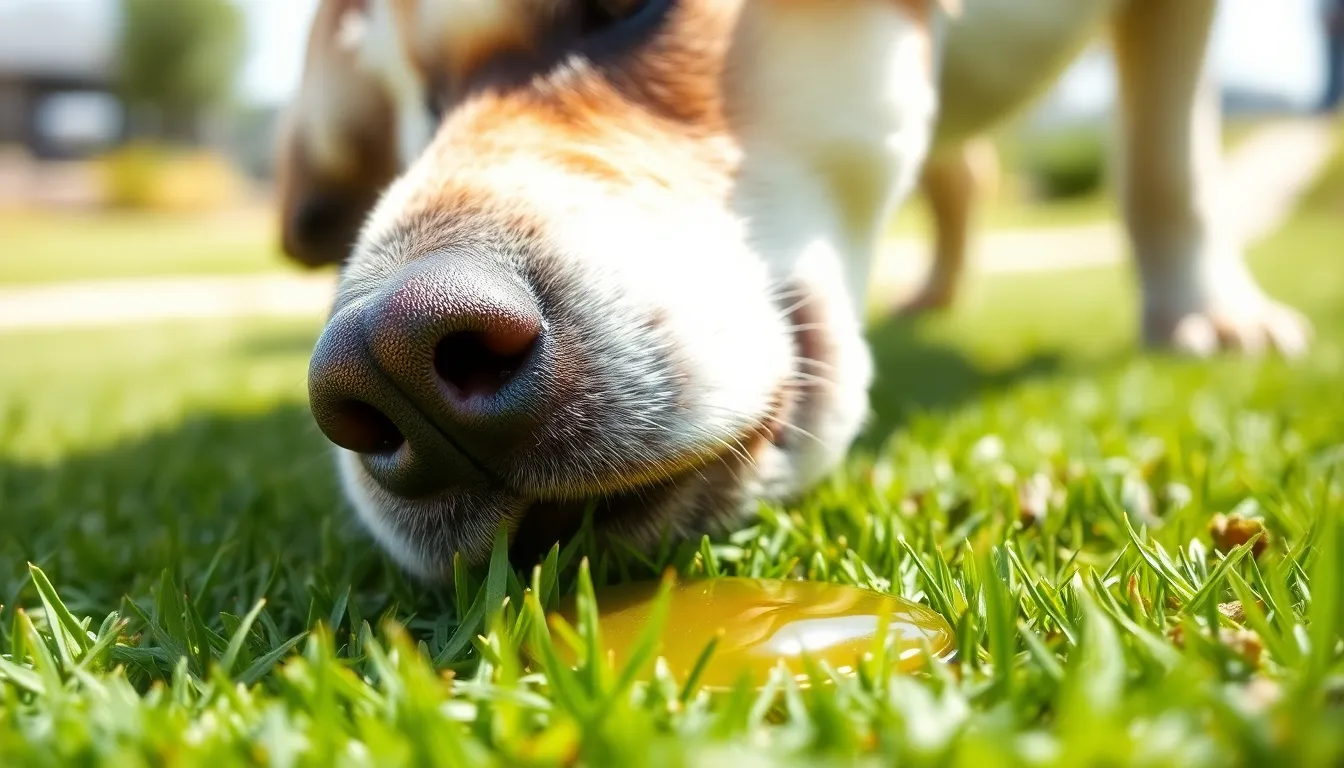Table of Contents
ToggleHave you ever walked outside and caught a whiff of something that made you question your dog’s diet? If dog pee smells like fish, you’re not alone. Many pet owners have experienced this peculiar scent and wondered what it means. Is Fido secretly a seafood lover, or is there something more going on?
While it might sound funny at first, this fishy odor could signal underlying health issues. It’s essential to understand why this happens and what you can do about it. From dietary changes to potential visits to the vet, knowing the cause can help keep your furry friend healthy and happy. So, let’s dive into the reasons behind this curious canine conundrum and explore how to tackle it with a smile.
Understanding Dog Pee Smells
Dog urine can emit various odors. Identifying these smells plays a role in assessing your pet’s health.
Common Odors in Dog Urine
Dogs’ urine may have distinct smells. Sweet odors often indicate high sugar levels, which can signify diabetes. A strong ammonia scent suggests dehydration or inadequate water intake. Then there’s a putrid smell that could point to urinary tract infections. Each odor serves as a potential health alert for pet owners. Recognizing these smells helps in early detection of issues requiring veterinary intervention.
When It Smells Like Fish
A fishy odor in dog urine can signal specific health concerns. This smell often arises from a bacterial infection in the urinary tract, particularly when bacteria break down protein. Some dogs may produce a fishy scent from a diet high in fish or certain supplements. It’s crucial for pet owners to monitor dietary changes that could cause this smell. Consulting a veterinarian when noticing a persistent fishy odor helps provide appropriate management and care for your pet’s health.
Possible Reasons for Fishy Odor

A fishy odor in dog urine often points to specific factors, both dietary and health-related. Understanding these reasons can help in addressing the issue promptly.
Diet and Nutrition Factors
High-protein diets, particularly those rich in fish, can lead to urine with a fishy aroma. Many commercial dog foods contain fish for omega-3 fatty acids. Dogs consuming these diets may show this scent in their urine. Additionally, certain human foods may contribute to odor changes; feeding fish scraps or dishes can result in noticeable smells. Monitoring food ingredients can ensure a balanced diet that avoids strong odors.
Health Issues to Consider
Health problems may cause urine to emit a fishy scent, indicating potential issues. Urinary tract infections, commonly caused by bacteria, often generate this odor. Infections can occur alongside other symptoms, such as frequent urination or straining. It’s also important to consider liver dysfunction, as liver problems can result in unusual urine smells. Regular check-ups with a veterinarian can help identify these underlying issues and facilitate effective treatment.
Diagnosing the Problem
Identifying the cause of a dog’s urine smelling like fish requires careful observation and appropriate action. Pet owners should monitor any additional symptoms that might indicate health concerns.
Observing Other Symptoms
Changes in behavior often accompany unusual urine smells. Look for signs such as increased thirst or frequent urination, as these can indicate dehydration or underlying kidney issues. If a dog appears lethargic or displays discomfort while urinating, these reactions may point towards an infection. Furthermore, vomiting or changes in appetite signify potential health problems. A holistic view of the dog’s overall health helps recognize patterns and triggers related to the fishy odor.
Seeking Veterinary Advice
Consulting a veterinarian becomes essential when a persistent fishy smell arises. Experienced veterinarians conduct thorough examinations to uncover underlying health issues effectively. Diagnostic tests, including urinalysis, help identify urinary tract infections or liver dysfunction. Clear communication about observed symptoms and dietary habits allows pet owners to assist veterinarians in tailoring treatment plans. Regular veterinary visits ensure that any health concerns are addressed promptly and effectively.
Treatment and Prevention
Addressing a fishy odor in dog urine involves specific dietary adjustments and regular health check-ups to maintain overall health.
Dietary Adjustments
Adjusting a dog’s diet can significantly impact urine odor. Switching to a high-quality dog food without fish may reduce fishy smells. This change removes certain protein sources that can contribute to the odor. Including fresh fruits and vegetables can also balance the diet and promote healthier urine. Pet owners can explore hydration strategies, ensuring their dogs drink enough water to dilute urine. Incorporating kidney-supportive foods into the diet may help maintain proper function and alleviate odors. Consulting a veterinarian before making dietary changes ensures that pets receive the necessary nutrients without compromising health.
Regular Health Check-ups
Annual veterinary visits play a crucial role in preventing health issues. Regular check-ups enable veterinarians to monitor overall health and catch any concerns early. Tests conducted during these visits can screen for urinary tract infections or liver dysfunction, both of which can cause odor changes. Vaccinations and preventative care enhance the pet’s immune system, further reducing health risks. Monitoring weight and body condition during check-ups supports overall wellness. Such proactive measures can address potential problems before they escalate, promoting a healthy and happy life for pets.
Addressing the issue of dog urine smelling like fish is essential for every pet owner. Understanding the potential causes can help in identifying health problems early. Whether it’s a dietary concern or a sign of a urinary tract infection, recognizing these odors is crucial for a dog’s well-being.
Taking proactive steps such as consulting a veterinarian and adjusting the diet can significantly improve a pet’s health. Regular check-ups and open communication with a vet can ensure dogs remain healthy and happy. By staying informed and attentive, pet owners can effectively manage their furry friends’ health and prevent more serious issues from arising.











